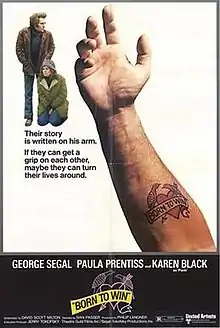Born to Win
Born to Win is a 1971 black comedy crime drama film directed by Ivan Passer and starring George Segal, Karen Black, Paula Prentiss, Hector Elizondo and Robert De Niro. Filming locations took place in Manhattan, specifically Times Square.
| Born to Win | |
|---|---|
 | |
| Directed by | Ivan Passer |
| Produced by | Philip Langner |
| Written by | David Scott Milton (story) Ivan Passer |
| Starring | George Segal Paula Prentiss Karen Black Hector Elizondo Jay Fletcher Robert De Niro Ed Madsen |
| Music by | William S. Fisher |
| Cinematography | Richard C. Kratina Jack Priestley |
| Edited by | Ralph Rosenblum |
| Distributed by | United Artists |
Release date |
|
Running time | 88 minutes |
| Country | United States |
| Language | English |
Plot
The film follows Jay Jay (George Segal), a former hair dresser who becomes a drug addict. He lives his new life by doing deals for Vivian (Hector Elizondo) from time to time. Jay thinks his life is about love and peace yet he and his fellow friend and junkie Billy Dynamite (Jay Fletcher) steal a safe behind the back of a cashier.
One day while trying to steal a car, he meets Parm (Karen Black), a free spirited girl. They go back to her apartment, he checks out what he can steal, and the two fall in love. While making love, Parm sees Jay's tattoo that says "born to win". Jay Jay's drug habit grows, and he soon resorts to robbery. He delivers drugs to Stanley and Marlene and the next day he goes back to rob the drugs back. Stanley has him beat up. On the threat of arrest, he works alongside two dirty policemen by becoming a narc. He reports on his former fellow junkies.
He and Parm flee the city in her car only to return for payment for the airport delivery. Some people want to see him dead. His friend Billy Dynamite shoots up with Jay's drugs and dies. It is called a "hot shot" intending to kill. He abandons his friend dead in the elevator. As the movie continues, Jay Jay sinks deeper into turmoil with feelings of self-hatred. He sits alone on a bench.
Cast
| Actor | Role |
|---|---|
| George Segal | Jay Jay |
| Karen Black | Parm |
| Paula Prentiss | Veronica |
| Hector Elizondo | Vivian |
| Jay Fletcher | Billy Dynamite |
| Robert De Niro | Danny |
| Ed Madsen | Detective |
| Marcia Jean Kurtz | Marlene |
| Irving Selbst | Stanley |
Filming
Ivan Passer and David Scott Milton started interviewing ex-addicts at the Phoenix House, near where they were putting on a play together titled Duet for Solo Voice. The resulting screenplay was originally much more serious in tone when shot. The comic elements were played up later during editing.
Milton based the characters in this film on the addicts who frequented the Manhattan diner he owned. He then adapted his observations of these characters into a play titled Scraping Bottom. The resulting screenplay for the film was titled Scraping Bottom. The copyright clearly can be read under the title as being credited to Scraping Bottom Productions.
Some of the characters in the film were played by actual junkies at the time, people who Passer encountered when researching the film.
The film was chosen to be screened at the New York Film Festival in October 1971.
The film was the first effort of a production company founded by George Segal and Jerry Tokofsky.
When Ed Madsen is chasing George Segal down the hallway, he slips and falls. This was not written in the screenplay. However, Passer thought it looked so real, he decided to leave it in the movie.
According to Passer, Robert De Niro nearly was fired many times throughout shooting. A devoted Stella Adler student, he did things to define his secondary character to draw attention from the leads.
Paula Prentiss received top billing, even though she appears on-screen for about three minutes. When asked about this at the press screening at the New York Film Festival, Passer said that her agent demanded it, adding "After all, what difference does it make?"
Reception
Born to Win received primarily mediocre reviews but many critics did make note that there was a form of brilliance within it. Chicago Sun-Times film critic Roger Ebert said of the film, "...a good-bad movie that doesn't always work but has some really brilliant scenes."[1] Roger Greenspun of The New York Times wrote, "...is only Passer's second movie, and it is a dreadful disappointment — but not without its reasons, and not, I think, without some honor."[2]
References
- Born to Win at RogerEbert.com
- Born to Win at NYTimes.com
External links
- Born to Win at IMDb
- Born to Win at Rotten Tomatoes
- Born to Win is available for free download at the Internet Archive
- Born to Win at AllMovie